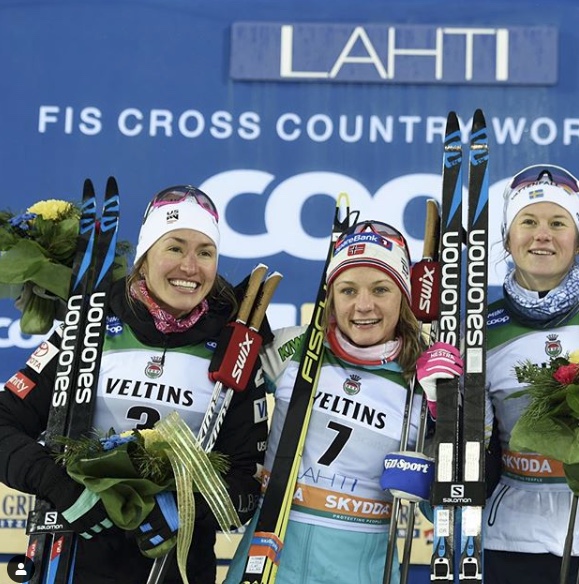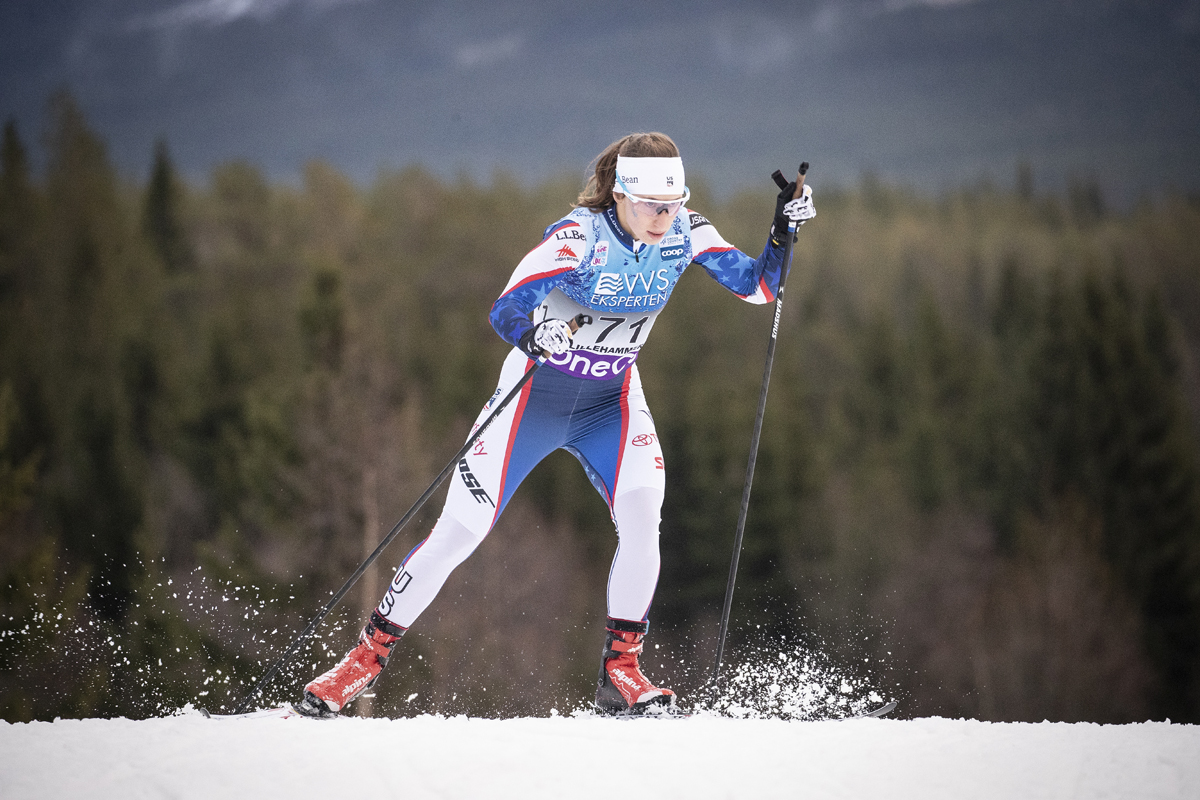
Out of the famed Lahti, Finland ski stadium and up and over the initial punchy climb, Norway’s Maiken Caspersen Falla, 40 seconds into the final of the women’s 1.4-kilometer sprint, charged ahead. In her draft, and sitting in fourth place around the hairpin that slung skiers back towards the stadium was the U.S. Ski Team’s Sophie Caldwell.
Descending back past the stadium and into the next decisive hill at 1:35 into the race, Caldwell made a powerful V2 move past Falla and her teammate Tiril Udnes Weng. Falla, noting the Caldwell surge matched the pace.
Atop the hill, at the course’s highpoint, Caldwell’s right side position gave her the lead as she rounded the horseshoe corner that brought skier’s descending into the main stadium. And from 2:00 minutes until 2:21 Caldwell was zooming and in charge. Sitting in her draft and sliding on Norwegian-wax-truck slick skis, Falla came around Caldwell on the outside of the long-curving lefthander into the finish straight.
Falla and Caldwell sped into the final meters. Falla took the win at the line in 2:43.64 minutes. Caldwell was second (+0.11), and Sweden’s Maja Dahlqvist sprinted to third overall (+0.37).
This was Caldwell’s third second place of the season. And as is the case most often when scanning race results or goggling a World Cup stream on the Internet, what we see is half the truth.
Caldwell landed in Finland on Thursday after a three-week stay at her home in Vermont. In a telephone call, Caldwell said it had been six years since she had last visited her family back home during the World Cup season. She returned home to be with her mother who has been ill.
“That family time was special and really nice,” said Caldwell. “The snow at home was amazing and I could ski from home. I pretty much could hang out with my family and go for skis from my house when I wanted to and not really have to leave home.”
While in Vermont, Caldwell trained, raced the Lake Placid SuperTour, and took time for herself and family. However, the decision was made to bring back a sense of normalcy and travel back to Europe for the World Cup.
Caldwell booked a ticket. Jetted six hours ahead to Finland. She went through her warm-up yesterday testing skis. She did what she does on Saturday; she qualified third; she won her semi-final in a four-way photo finish; she skied with her Caldwell smarts to place second. No pizazz. No look-at-me social media posts. It was a steady state Sophie Caldwell on the podium.
“It was really nice to be back and even though there is a lot going on in the back of my head, on race day it is nice to be out there and go through the motions that I know and still do what works well for me. And that is staying calm and staying focused and just taking things one step at a time,” reflected Caldwell when asked about her day.
With Near-freezing temperatures and saturated snowpack that by all accounts was Formula One fast, the racing was tight and tactical. In her quarter and semi-final, Caldwell played coy, sitting back in the draft on the long final descent into the stadium.
“But in my semi, I was feeling pretty strong on the final uphill,” Caldwell said. “And in my final, I decided to take the lead there and in hindsight, I don’t know if it was the smartest thing because of course then people can draft off of you. I am not someone who usually likes to lead. And I saw it as an opportunity to give that a try and I was feeling good there. I pushed it and took the lead and then I think Maiken was in my draft because she came around me on the downhill. But I don’t know. I think it is good to try. Skiing tactically really well is, of course, important but it is also riskier when you are not in the front.”
Those comments are in the moment reflections of an athlete in their prime. Her blinders on for 2:32.75 seconds – a blip really – and Caldwell continued perhaps the most understated run this season on the World Cup with her second place.
Today, she did this all with a new rock on her finger as she and longtime partner Simi Hamilton were engaged while back in Vermont.
For twenty-four-year-old Kelsey Phinney (SMS T2) Saturday was a first. She earned her career first World Cup points by placing 19th overall. Phinney’s race day began by qualifying in 27th. According to the International Ski Federation (FIS), this was Phinney’s seventh World Cup race and her first time qualifying for the heats. Last season, in March, in her first career World Cup race, also a skate sprint in Lahti, Phinney posted a 36th overall. Until today, that had been her best World Cup result.
After the SuperTour in Lake Placid, Phinney joined the U.S. Ski Team sprinters in Vålådalen, Sweden where she trained for 10 days.
“It feels serendipitous to qualify for my first heats in Lahti as my first World Cup was here last year,” Phinney wrote in an email. “I had a good feeling going into today for sure! Last year, I just went the pace I saw the top girls going and it worked for half of the course (I was top 5 at the half way point), but I blew up on the big climb and lost a lot of time. It was nice to race on a course I’ve raced before, as my other world cups have all been firsts for me. I knew for this course that I had the speed but also from my experience during period 1, I had more confidence in my pacing this time around. I knew I was making up time on the big hill this year, skiing smarter than last year and then to see I had qualified was one of those great moments you have to cherish in sport. I really enjoy the mix of hop skate, big V2 and big downhills on this course. Plus, my SMST2 coach Pat O’Brien is over here providing wax support and I had great skis today, and it was so special to have him here today!”

Phinney, who has been on the national radar for several years, earned her first U.S. National’s podium this season. She placed third in the skate sprint. However, Phinney did race the early season World Cups in Ruka, Lillehammer, and Davos. That experience, according to Phinney, helped her push through into the heats on Saturday.
“It feels so good to make it in the heats, that’s my favorite part of sprint racing is the head to head tactics,” explained Phinney. “But you have to figure out how to ski fast and smart enough in the qualifier to get there, and it is not easy to do that by any means! I feel so lucky to have been over in Europe for all of period 1 with the rest of the U.S. women’s team providing so much insight, advice, perspective, and inspiration. There’s really nothing that compares to just getting more experience over here. It takes time to figure out how to deal with the nerves, ski testing, and confidence over here.”
Julia Kern (USST D-Team) came into the day in recovery mode. Having fallen ill during the recently concluded U23 World Championships in Lahti, Kern has lacked on-snow time and elevated heart rate exercise to tune her motor.
“Definitely feeling flat given that I didn’t train for eight days straight and have not been moving much,” Kern said. “I think mentally I wasn’t quite into it because I was making the call in the morning and twenty minutes before the start I was torn fifty-fifty with whether I should even start. .. I am not feeling fully one hundred percent healthy. But in the race itself, the conditions were really fast. I have been skiing in -10 to -15 Celsius temps the last few weeks and the fast track felt really good. It went by way faster than I expected so it felt pretty good but I didn’t really feel like I was firing on all cylinders. But I didn’t expect that either. It was a plan to be a wake-up call for my body for next weekend’s World Cup races.”
Kern has been nominated to the 2019 U.S. Team for the upcoming World Championships in Seefeld, Austria. Kern said she is not guaranteed a start at World Championships as only four U.S. athletes will contend the individual sprint in Seefeld. Sprint results on the World Cup prior to Seefeld will help determine which athlete’s will race Seefeld’s individual sprint.
“Still a little congested and still coughing a bit but my energy is really good and I think that is what made me decide to race this weekend,” said Kern. “As of right now I am in the team sprint tomorrow but we can change up until two hours before the race and I am going to wait and see how my body reacts for the rest of the day and into the morning tomorrow and make the call.”
Ida Sargent (USST) raced in the heats after qualifying in 26th. She was eliminated in the first heat when she placed sixth in a photo finish. Sargent ended up 30th overall.
Canada’s Dahria Beatty qualified in 25th and placed 24th overall after placing fifth in her heat.
“I was happy with how my body felt skiing in my heat today, but I kept putting myself in positions where I got a bit boxed out,” Beatty said according to a Cross Country Canada press release. “The final corner at the top of the big climb is always a decisive spot on this course. I tried to stay in contact there for the finish, but it ended up a bit strung out over the top. … It maybe wasn’t the best tactics today, but I feel like my fitness is good again after our training camp in Davos and that gives me confidence heading into World Championships.”
Racing continues tomorrow for the men and women with a classic team sprint.
Jason Albert
Jason lives in Bend, Ore., and can often be seen chasing his two boys around town. He’s a self-proclaimed audio geek. That all started back in the early 1990s when he convinced a naive public radio editor he should report a story from Alaska’s, Ruth Gorge. Now, Jason’s common companion is his field-recording gear.



